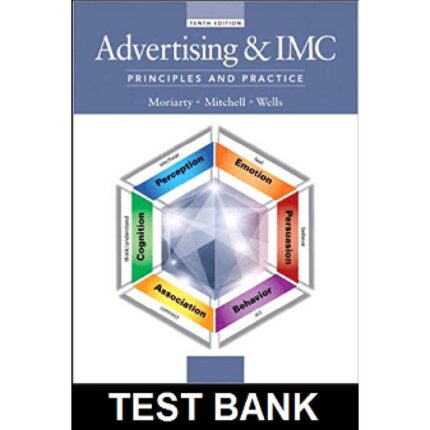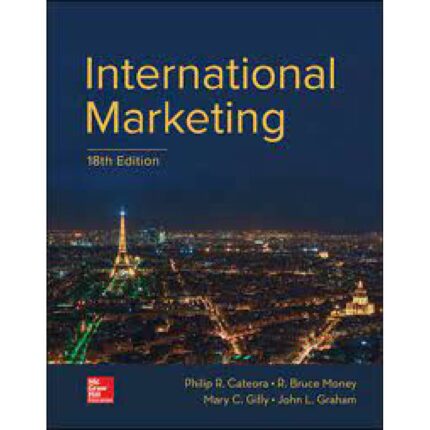Basic Marketing Research 8th Edition By Tom – Test Bank
1. The three key decisions to make when collecting data by communication include which of the following? a. The degree of structure to use.
b. Whether to disguise the questionnaire.
c. Which method of questionnaire administration to use.
d. All of the above.
e. Both a and c.
ANSWER: d
POINTS: 1
DIFFICULTY: Easy
NATIONAL STANDARDS: United States – BUSPROG: Analytic
2. Questions that give the respondent no indication of the true purpose of the research project are known as a. disguised questions.
b. confounded questions.
c. structured questions.
d. undisguised questions.
e. unstructured questions.
ANSWER: a
POINTS: 1
DIFFICULTY: Easy
NATIONAL STANDARDS: United States – BUSPROG: Analytic
3. Which of the following is NOT an advantage of structured-undisguised questions? a. Simple to administer.
b. Easy to analyze.
c. Unbiased response categories.
d. Very reliable.
e. Easy to tabulate.
ANSWER: c
POINTS: 1
DIFFICULTY: Easy
NATIONAL STANDARDS: United States – BUSPROG: Analytic
4. The responses, as well as the questions, are standardized in a(n)
a. unstructured-disguised questionnaire.
b. unstructured-undisguised questionnaire.
c. structured-undisguised questionnaire.
d. depth interview.
e. focus group.
ANSWER: c
POINTS: 1
DIFFICULTY: Easy
NATIONAL STANDARDS: United States – BUSPROG: Analytic
5. Which of the following is FALSE?
a. Structured-undisguised questioning produces more reliable results, although this greater reliability may be obtained at the loss of some validity.
b. When replies are limited to fixed answers as in structured-undisguised questionnaires, there is the minimum possibility for the respondent to misunderstand the meaning intended by the interviewer and vice versa.
c. The responses as well as the questions are standardized in a structured-undisguised questionnaire.
d. One shortcoming of the structured-undisguised question is that it often does not allow an expression of strength and feeling.
e. In structured questions the frame of reference is often obvious from the alternatives.
ANSWER: b
POINTS: 1
DIFFICULTY: Easy
NATIONAL STANDARDS: United States – BUSPROG: Analytic
6. Which of the following statements is NOT true of fixed-alternative questions?
a. Everyone receives the same questions.
b. The questions are open-ended.
c. They are commonly used to collect primary data.
d. Everyone responds by choosing from among the same set of possible answers. e. All of the above are true.
ANSWER: b
POINTS: 1
DIFFICULTY: Easy
NATIONAL STANDARDS: United States – BUSPROG: Analytic
7. With unstructured-undisguised questionnaires the purpose of the study is
a. open to interpretation.
b. not communicated to the respondents.
c. clear but the responses to the questions are open ended.
d. clear but the responses to the questions are dichotomous.
e. to define the responses that are open-ended.
ANSWER: c
POINTS: 1
DIFFICULTY: Easy
NATIONAL STANDARDS: United States – BUSPROG: Analytic
8. “How do you feel about the Apple, Inc.?” is an example of which type of question? a. Fixed-alternative
b. Structured
c. Open-ended
d. Close-ended
e. a, b, and c.
ANSWER: c
POINTS: 1
DIFFICULTY: Easy
NATIONAL STANDARDS: United States – BUSPROG: Analytic
9. After John purchased his new car, the car dealer sent him a new owner satisfaction survey, which consisted of several statements about his car, which John was to indicate agreement or disagreement with by checking the appropriate boxes. This survey is a. unstructured-undisguised.
b. structured-disguised.
c. sentence completion.
d. structured-undisguised.
e. word association.
ANSWER: d
POINTS: 1
DIFFICULTY: Easy
NATIONAL STANDARDS: United States – BUSPROG: Analytic
10. Fixed-alternative questions would be inappropriate for securing information about respondents’ a. apartment rental payments.
b. motivations in husband-wife interactions over purchase decisions. c. age.
d. awareness of current events.
e. income level.
ANSWER: b
POINTS: 1
DIFFICULTY: Easy
NATIONAL STANDARDS: United States – BUSPROG: Analytic












